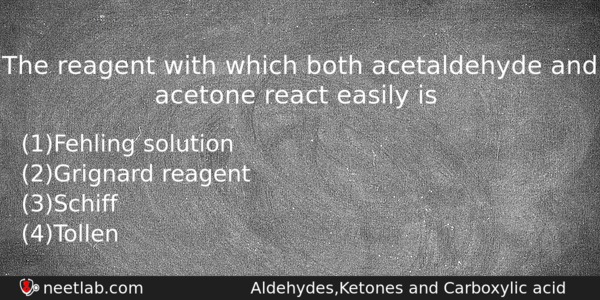| ⇦ | 
| ⇨ |
The reagent with which both acetaldehyde and acetone react easily is
Options
(a) Fehling solution
(b) Grignard reagent
(c) Schiff’s reagent
(d) Tollen’s reagent
Correct Answer:
Grignard reagent
Explanation:
No explanation available. Be the first to write the explanation for this question by commenting below.
Related Questions: - A mixture of two moles of carbon monoxide and one mole of oxygen
- Which one of the following is the correct order of size of othe iodine specifies?
- Vapour density of a gas is 22. What is its molecular weight
- Which of the following displaces Br₂ from an aqueous solution containing bromide
- Two possible stereo-structures of CH₃CHOHCOOH, Which are optically active are called
Topics: Aldehydes Ketones and Carboxylic Acid
(89)
Subject: Chemistry
(2512)
Important MCQs Based on Medical Entrance Examinations To Improve Your NEET Score
- A mixture of two moles of carbon monoxide and one mole of oxygen
- Which one of the following is the correct order of size of othe iodine specifies?
- Vapour density of a gas is 22. What is its molecular weight
- Which of the following displaces Br₂ from an aqueous solution containing bromide
- Two possible stereo-structures of CH₃CHOHCOOH, Which are optically active are called
Topics: Aldehydes Ketones and Carboxylic Acid (89)
Subject: Chemistry (2512)
Important MCQs Based on Medical Entrance Examinations To Improve Your NEET Score
18000+ students are using NEETLab to improve their score. What about you?
Solve Previous Year MCQs, Mock Tests, Topicwise Practice Tests, Identify Weak Topics, Formula Flash cards and much more is available in NEETLab Android App to improve your NEET score.
Share this page with your friends

Because the other three reagents reacts only with aldehydes